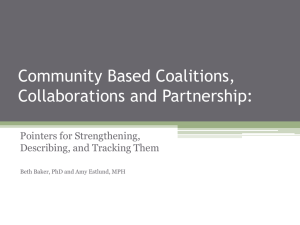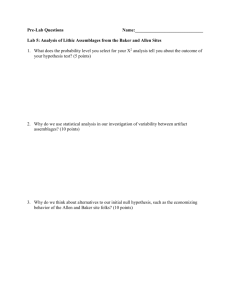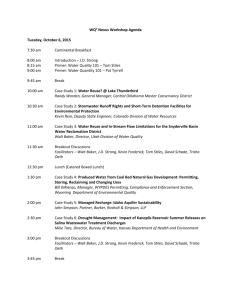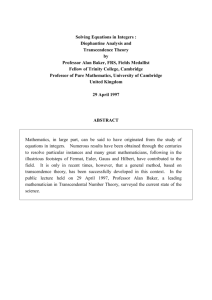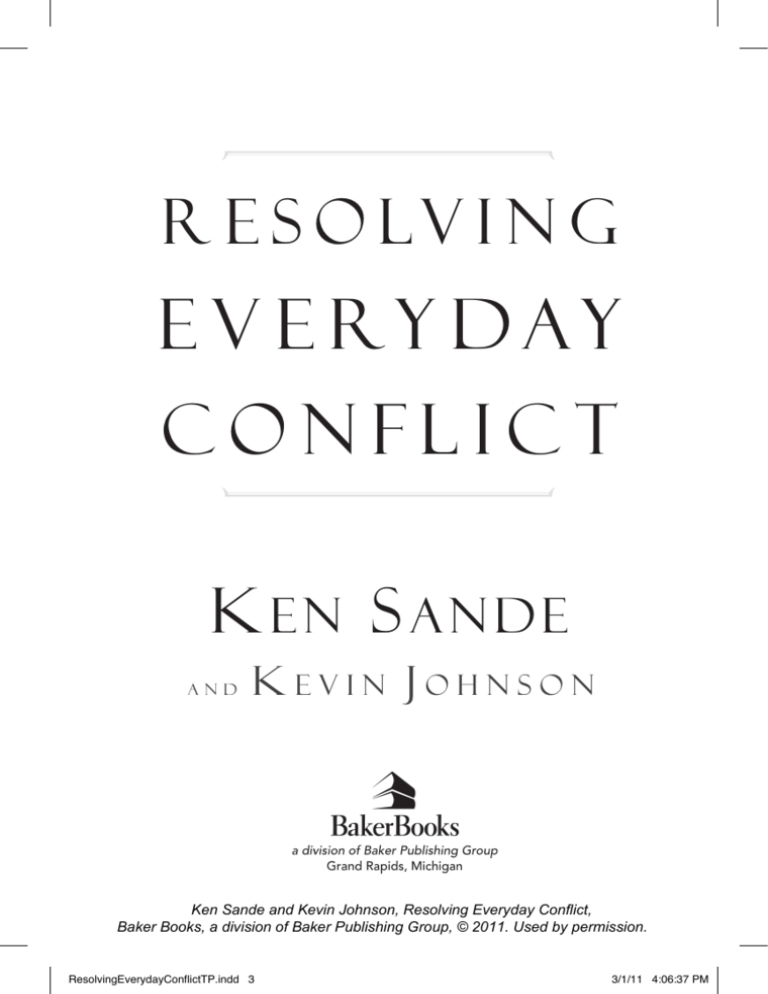
R E S O LV I N G
E v e ry day
conflict
Ken Sande
and
Kevin Johnson
C
Ken Sande and Kevin Johnson, Resolving Everyday Conflict,
Baker Books, a division of Baker Publishing Group, © 2011. Used by permission.
ResolvingEverydayConflictTP.indd 3
3/1/11 4:06:37 PM
Resolving Everyday Conflict
Copyright © 2011
Peacemaker Ministries
Scripture quotations identified NIV are from THE HOLY BIBLE, NEW INTERNATIONAL VERSION,® NIV® Copyright © 1973, 1978, 1984, 2010 by Biblica,
Inc.™ Used by permission. All rights reserved worldwide.
Scripture quotations identified NLT are from the Holy Bible, New Living Translation, copyright © 1996, 2004. Used by permission of Tyndale House Publishers,
Inc., Wheaton, Illinois 60189. All rights reserved.
Scripture quotations identified ESV are from The Holy Bible, English Standard
Version,® copyright © 2001 by Crossway, a publishing ministry of Good News
Publishers. Used by permission. All rights reserved.
Published by Baker Books
A division of Baker Publishing Group
P.O. Box 6287, Grand Rapids, MI 49516-6287
www.bakerbooks.com
All rights reserved. No part of this publication may be reproduced, stored in a
retrieval system, or transmitted in any form or by any means—for example, electronic, photocopy, recording—without the prior written permission of the publisher.
The only exception is brief quotations in printed reviews.
Printed in the United States of America
Library of Congress Cataloging-in-Publication Data
Sande, Ken.
Resolving everyday conflict / Ken Sande and Kevin Johnson.
p. cm.
ISBN 978-0-8010-1386-7 (pbk. : alk. paper) 1. Conflict management—Religious aspects—Christianity. 2. Interpersonal relations—Religious aspects—
Christianity. I. Johnson, Kevin (Kevin Walter) II. Title.
BV4597.53.C58S26 2011
248'.4—dc22
2011002289
Ken Sande and Kevin Johnson, Resolving Everyday Conflict,
Baker Books, a division of Baker Publishing Group, © 2011. Used by permission.
ResolvingEverydayConflictTP.indd 4
3/1/11 4:06:38 PM
Contents
Introduction 7
1. The Nature of Conflict: What It Is and Where It Comes
From 11
2. The Hope of the Gospel: Life-Changing Power that Can
Heal Your Relationships 23
3. Escaping, Attacking, or Peacemaking: A Biblical Response
to Conflict 35
4. G1: Glorify God: Bringing God into Your Situation 45
5. G2: Get the Log Out: Owning Your Part of a Conflict 57
6. G3: Gently Restore: Helping Others Own Their Part of a
Conflict 71
7. G4: Go and Be Reconciled: Giving Forgiveness and
Arriving at a Reasonable Solution 85
8. Overcome Evil with Good: Pressing On with Deliberate
Love 99
9. Appendix: Questions for Reflection and Discussion 111
Ken Sande and Kevin Johnson, Resolving Everyday Conflict,
Baker Books, a division of Baker Publishing Group, © 2011. Used by permission.
ResolvingEverydayConflictTP.indd 5
3/1/11 4:06:38 PM
Introduction
W
elcome!
Since you picked up this book, there’s a good chance
you’re experiencing some conflict in your life. Welcome to the
club!
Conflict is a normal part of life. As long as you live around
other people, you’re going to find your opinions and actions
bumping up against someone else’s. Sometimes you’ll be able to
simply back off and go your own way. But you have probably
discovered that sometimes walking away doesn’t work.
Many relationships are too important to walk away from.
Some issues are too big to give in to. And some people just
won’t let go until they get everything they want. Add a variety
of intense emotions to the mix, and conflict can get very messy
and painful.
But it doesn’t have to be that way. If you keep reading this
book, you’ll discover that conflict doesn’t have to be painful or
destructive. As you learn God’s ways of resolving conflict, you
Ken Sande and Kevin Johnson, Resolving Everyday Conflict,
Baker Books, a division of Baker Publishing Group, © 2011. Used by permission.
ResolvingEverydayConflictTP.indd 7
3/1/11 4:06:38 PM
8
Resolving Everyday Conflict
can approach conflict as an opportunity to make relationships
closer and stronger, to find solutions that are fair for everyone,
and—best of all—to please and honor God.
Please and honor God? I’ll bet that isn’t the first thing you
think of when conflict strikes. Well, it wasn’t for me either. For
the first twenty-five years of my life, my chief goal in conflict
was to please and honor myself and get what I wanted. God
was not in the picture. As a result, when I encountered conflict, I either walked over others or simply gave up on difficult
relationships.
But while I was working as an engineer in the medical field,
Jesus came into my life in a personal and powerful way. He began
to change me in ways that turned my priorities upside down.
He also gave me new insights and skills for dealing with difficult people. As a result, I became a more productive employee
and was promoted. My friends told me I was a lot easier to be
around!
God continued to transform me into a peacemaker during
law school and my early days as an attorney. In one conflict
after another—some of which had been tied up in court for
years—God was working through me to bring peace in seemingly impossible situations.
I found peacemaking to be so rewarding that I became a
full-time Christian conciliator in 1982. Since then I have been
privileged to see how God’s peacemaking principles can be used
to stop divorces, rebuild marriages, restore friendships, reunite
churches, settle lawsuits, and even bring peace between warring
tribes in Africa and Asia. Seriously!
If you want to learn how to apply these principles in your life,
Ken Sande and Kevin Johnson, Resolving Everyday Conflict,
Baker Books, a division of Baker Publishing Group, © 2011. Used by permission.
ResolvingEverydayConflictTP.indd 8
3/1/11 4:06:38 PM
Introduction
9
keep reading this book. If you take these concepts seriously, your
marriage, friendships, and job will never be the same. Instead of
running away from conflict or being the one who always seems
to make it worse, you can become the person others count on
to bring understanding, justice, and reconciliation.
If you find the principles in this book helpful and want to
dig deeper on specific peacemaking issues, read my book The
Peacemaker: A Biblical Guide to Resolving Personal Conflict,
which has been translated into eleven languages and is being used
around the world to teach Christians how to resolve conflict.
For more information on Peacemaker Ministries’ resources,
testimonies, training, or services, visit www.Peacemaker.net.
May God transform you more and more into a peacemaker
and use you to bring peace into the lives of those around you.
Ken Sande
Ken Sande and Kevin Johnson, Resolving Everyday Conflict,
Baker Books, a division of Baker Publishing Group, © 2011. Used by permission.
ResolvingEverydayConflictTP.indd 9
3/1/11 4:06:38 PM
1
The Nature of Conflict
What It Is and Where It Comes From
I
travel often for work, and eating in restaurants can grow old.
When I finally reach home, there’s only one place I want to
eat: our kitchen table. But while I’m away, Corlette’s hands have
been full managing our family, so when I get back, she loves to
eat any place but home!
In the early days of our marriage, our differing desires on
where to eat could lead to ridiculously intense conflict. When
Corlette met me at the airport, I would hug the kids, kiss her
cheek, and then quickly ask, “So what’s for dinner?”
Sometimes she responded, “Ken, it’s been a crazy day. I didn’t
have time to make anything. Can we just go out?”All too often
my selfishness kicked in. With a deep sigh I replied, “Okay, if you
really want to. But I wish you’d think of me once in a while. I’ve
Ken Sande and Kevin Johnson, Resolving Everyday Conflict,
Baker Books, a division of Baker Publishing Group, © 2011. Used by permission.
ResolvingEverydayConflictTP.indd 11
3/1/11 4:06:38 PM
12
Resolving Everyday Conflict
been on the road for days, all alone in drab hotel rooms, eating
out three times a day. I’d just love a home-cooked meal.”
“Me think about someone else?!” Corlette might reply. “You
didn’t even ask what kind of day I’ve had. The kids have been
impossible. I had to take Mom to the doctor. And the dog threw
up all over the carpet. But all you’re thinking about is my pulling
together a big meal for you!”
Sometimes one of us realized we were sliding down a slippery
slope and saw it was time to turn the conversation in a different
direction. Other times, I’m ashamed to say, we headed further
downhill before we realized how selfish we were acting.
Never-Ending Conflict
Aren’t you tired of all the fighting? From our homes to our
neighborhoods, workplaces, schools, and churches, conflict surrounds us. As a lawyer and full-time Christian mediator, I have
seen thousands of conflicts up close. I have witnessed divorce
and custody battles, neighborhood feuds, personal injury actions,
contract disputes, and church splits. As a former engineer and
now as a ministry leader, I know how quickly a workplace can
become poisoned by disagreements. As a husband and father, I
understand the day-to-day frustrations families face at home.
Because I live in the same world you do, I know that
chances are, you’ve experienced conflict recently as well. Perhaps you’re experiencing the anguish of an unreconciled relationship right now.
I want to give you another way of handling conflict that
you can use the rest of your life. Even though conflict is present
in every part of life, I have seen peace come even to the most
hopeless situations. I have watched people learn to work through
Ken Sande and Kevin Johnson, Resolving Everyday Conflict,
Baker Books, a division of Baker Publishing Group, © 2011. Used by permission.
ResolvingEverydayConflictTP.indd 12
3/1/11 4:06:38 PM
The Nature of Conflict
13
the most severe differences, turning frustration into opportunity.
They overcome division and enjoy harmony. Their anger gives
way to love, mercy, forgiveness, strength, and wisdom. How
do these amazing changes happen? Through a special kind of
peacemaking. This peacemaking is applying the gospel and God’s
principles for problem solving to everyday life.
In the Bible, God gives us a powerful way to respond to conflict. Our natural approach to conflict is to focus on what an opponent did to us. Yet if we try to resolve conflict by focusing only on
what someone else did wrong, we never reach a real solution.
God’s approach begins with us understanding the gospel—
everything Jesus Christ accomplished for us on the cross. Through
the gospel, God treats us with extraordinary, unearned kindness.
And his gracious response to us gives us power to respond to
others in an entirely new way. Once we understand how the
good news of Jesus empowers real reconciliation, we can begin
to learn and apply God’s practical steps to peacemaking. These
steps aren’t difficult to discover. They’re clearly taught by Jesus
and others in the Bible. God explains why conflicts happen and
how we should deal with them.
Peacemaking is applying the gospel and God’s
principles for problem solving to everyday life.
Peacemaking comes naturally to no one. It always goes
against our normal human impulses. But the more we draw on
God’s power, and the more we wrestle with and obey what God
teaches, the more effectively we can work out disagreements
with others.
Ken Sande and Kevin Johnson, Resolving Everyday Conflict,
Baker Books, a division of Baker Publishing Group, © 2011. Used by permission.
ResolvingEverydayConflictTP.indd 13
3/1/11 4:06:38 PM
14
Resolving Everyday Conflict
What Is Conflict?
Conflict happens when you are at odds with another person
over what you think, want, or do. Conflict can involve everything
from small disagreements to major disputes, and it can result in
not only hurt feelings, but also damaged property.
Conflict happens when you are at odds with
another person over what you think, want, or do.
Conflict begins when you don’t get what you want. The
conflicts you experience don’t happen in a vacuum. They don’t
appear from nowhere. If you live in the Western world, you are
most likely bombarded all day long by messages that are 100
percent about self. Life is all about me. My wants, my wishes, my
desires, and my needs are much more important than anything
you value. If you’re a parent, you know that children absorb this
message all day long. They hear, “I have the right to whatever
I want. I have the right to have it my way. I deserve it.” If this
idea sinks in—the idea that I deserve whatever I want, whenever
I want it—I’m going to get mad when I don’t get it. And if I’m
not getting what I want, I might start punishing others for it.
That’s where conflict starts. I fight because I’m not getting what
I want. James 4:1–2 points out the source of conflict when it
tells us, “What causes fights and quarrels among you? Don’t
they come from your desires that battle within you? You want
something but don’t get it. You kill and covet, but you cannot
have what you want. You quarrel and fight.”
Ken Sande and Kevin Johnson, Resolving Everyday Conflict,
Baker Books, a division of Baker Publishing Group, © 2011. Used by permission.
ResolvingEverydayConflictTP.indd 14
3/1/11 4:06:38 PM
The Nature of Conflict
15
Christians and Conflict
As Christians we can’t escape conflict. Maybe you have picked
up the idea that being a good person will help you steer clear of
major clashes. If you try hard to do right, then people won’t disrespect or mistreat you. Or perhaps you have been taught that if
you do clash with others, turning to God for help will effortlessly
make everything better. Life as a Christian doesn’t work that way.
We can’t easily escape conflict, because we are all products of our
own misguided desires. We are all part of the problem, and the
problem is part of all of us. Even if we attempted to withdraw
into a cozy cocoon, conflict would come with us.
Conflict happens among Christians because our sinful self
gladly cooperates with messages that say “I can have whatever
I want.” We won’t fight it because we like it. Our sinful nature
never objects to the smallest outside encouragement to live for
self. We find ourselves thinking “Yeah, it really is all about me.
Maybe my needs are supreme. Maybe I should have what I
want, and my needs are what I should be worrying about. I can’t
worry about what other people want. That’s their problem.” Like
everyone else, we are prone to develop the total self-absorption
that is the root of conflict.
Think and talk: Where are you seeing conflict in
your life right now? What part
does selfishness play in that dispute?
Unfortunately, conflict invades Christian relationships just
as it does every other human relationship. Conflict happens
among us in many ways. There might be loud disagreements,
even public splits. Or there might be low-level conflict, behavior
Ken Sande and Kevin Johnson, Resolving Everyday Conflict,
Baker Books, a division of Baker Publishing Group, © 2011. Used by permission.
ResolvingEverydayConflictTP.indd 15
3/1/11 4:06:38 PM
16
Resolving Everyday Conflict
like gossip, slander, backbiting, criticism, undermining, etc.
When our ministry staff asks churches if they experience conflict,
they sometimes say, “Absolutely not. No conflict here.” We
ask, “Any gossip?” They say, “Lots of gossip.” We ask, “How
about backbiting?” They nod. Soon people start to get the point.
People fight over worship styles, building design, curriculum,
and everything else. Christians face conflict like everyone else.
Even if we see our own brokenness and dysfunction, we don’t
know how to fix it.
Causes of Conflict
While many conflicts bring disastrous results, conflict isn’t
always bad. Even the most mature of Christians experience conflict
and can come out better for it. In the New Testament account of
the early Christian church, we read that conflict erupted because
some people complained that they were being shortchanged in the
distribution of food (Acts 6). The apostles responded promptly
and wisely, calling a meeting to encourage discussion and develop
a solution. The result was that the congregation selected seven
trusted men to oversee the distribution of food. Verses 5 and 7
tell us, “This proposal pleased the whole group. . . . So the word
of God spread. The number of disciples in Jerusalem increased
rapidly, and a large number of priests became obedient to the
faith.” Conflict, handled well, became beneficial.
The Bible teaches that some conflicts come from God-given
diversity. Each of us is like a different part of the human body, an
analogy Paul uses in 1 Corinthians 12:12–31. We each have an
important role to play; we each bring different perspectives and
gifts to life. This God-given diversity leads to natural differences.
Since God created us as unique individuals, we all have varying
Ken Sande and Kevin Johnson, Resolving Everyday Conflict,
Baker Books, a division of Baker Publishing Group, © 2011. Used by permission.
ResolvingEverydayConflictTP.indd 16
3/1/11 4:06:38 PM
The Nature of Conflict
17
opinions, convictions, desires, perspectives, and priorities. If
we handle differences well, they stimulate dialogue, creativity,
and change. They keep life interesting. Many of our differences
aren’t about right or wrong; they are simply the result of these
God-designed personal preferences.
What God desires is unity, not uniformity. Instead of avoiding all conflicts or demanding that others always agree with us,
we can celebrate the variety of God’s creation and learn to accept
and work with people who simply see things differently than we
do. Unity means we are of one purpose, one mind, one heart.
Uniformity means we are clones of each other, with everyone
looking, thinking, and acting the same.
Other conflicts result from simple misunderstandings. There
isn’t a person on earth who communicates perfectly, whether
speaking or listening. Countless conflicts arise when we think
we have spoken and made ourselves clear—or we have listened
and understood correctly—yet we jump to faulty conclusions.
Our prejudices and impatience all feed our misunderstandings.
Unfortunately, as fallen humans we tend to take offense and
assume the worst. God wants us to assume the best until we
actually know otherwise.
Although much conflict is the natural result of God-given
diversity and simple misunderstandings, many conflicts are the
result of sinful attitudes and desires that lead to sinful words
and actions.
All of us say and do self-motivated, self-centered, sinful
things—and those things all trigger conflict. Think again about
James 4:1–2: “What causes fights and quarrels among you? Don’t
they come from your desires that battle within you? You want
Ken Sande and Kevin Johnson, Resolving Everyday Conflict,
Baker Books, a division of Baker Publishing Group, © 2011. Used by permission.
ResolvingEverydayConflictTP.indd 17
3/1/11 4:06:38 PM
18
Resolving Everyday Conflict
something but don’t get it. You kill and covet, but you cannot
have what you want. You quarrel and fight.” This verse provides
crucial insights we will look at in greater detail in chapter 5. But
for now we should be aware of three important facts:
• People are different and want different things. That’s often the
SPARK of conflict.
• Differences get worse when sinful selfishness and pride drive
our reactions. That’s the GASOLINE of conflict.
• Destruction results when we fail to respond properly and allow
our sinful desires to continue driving our words and actions.
That’s the FIRE of conflict.
The problem isn’t where we start, but where we end up. The
issue isn’t that we’re different; it’s what we do with our disagreements. Seldom do we choose to lay down our rights and
humbly work through our difficulties with others. Instead we
say, “We’re different. I’m right. I’ve got to win.”
spark
gasoline
fire
We have natural differences—but our sinful nature is really
what makes conflict so destructive. This is where the biblical
peacemaking process stands apart from almost all methods of
secular conflict resolution. While those methods talk about
resolving differences, they completely miss the sinful cravings
that are the gasoline that turns conflict explosive. Secular conflict resolution tells you that personal differences are something
you can simply talk through. It misses the biblical insight that
Ken Sande and Kevin Johnson, Resolving Everyday Conflict,
Baker Books, a division of Baker Publishing Group, © 2011. Used by permission.
ResolvingEverydayConflictTP.indd 18
3/1/11 4:06:38 PM
The Nature of Conflict
19
sinful desires often trigger differences that can only be resolved
by a change of heart.
Our sinful desires fuel conflict in ways we probably haven’t
paused to understand. When we want something but can’t get
it, our unmet desire can work itself deeper and deeper into our
hearts. Our desire becomes a demand, something we sin to obtain
or sin if we can’t obtain. Our hearts become controlled by our
craving, ruled by something we want or love, something we
serve or trust, something we depend on for comfort. What has
actually happened is this: We have made the thing we desire into
an object of worship. We have elevated our desire into a false
god, what the Bible calls an idol. Not an idol of wood, stone,
or metal, but a desire or craving that controls our lives.
The sinful root of conflict is really idolatry. As Christians,
we know we should want what God wants, but when we allow
an idol to control our hearts, we only want what we want. The
one cure for idolatry is to look to God himself, returning him
to his rightful first place in our lives and deciding we want his
will for us above any other desire.
Think and talk: When in your life have you seen
a desire grow into an idol?
The world around us doesn’t help us put God at that rightful
first place in our lives. Notice that while we are in conflict, the
messages we hear pump on more and more gasoline. They echo
back to us what our sinful nature is already saying: “You deserve
it.” “Stand up for yourself.” “Don’t get mad; get even.” “Call
1-800-LAWYERS.” It’s tough to stand up to these messages. As
people, our default mode is, “My needs reign supreme.” Our
Ken Sande and Kevin Johnson, Resolving Everyday Conflict,
Baker Books, a division of Baker Publishing Group, © 2011. Used by permission.
ResolvingEverydayConflictTP.indd 19
3/1/11 4:06:38 PM
20
Resolving Everyday Conflict
sinful selves tell us we have the right to do what we want, and
hardly anyone will tell us to look out for someone else. No one
ever says to look out for number two; it’s always, “Look out for
number one.” The resulting conflagration can set aflame every
part of life, causing every kind of conflict and pain.
The Good News about Conflict
Jesus said that our response to conflict can prove we are
his followers. Not long before his death, Jesus told his closest
followers, “By this all men will know that you are my disciples,
if you love one another” (John 13:35). Right before soldiers
arrested Jesus and took him away to the cross, he prayed for
believers in all times and places, pleading, “May they be brought
to complete unity to let the world know that you sent me and
have loved them even as you have loved me” (John 17:23). Jesus
is predicting that the world will never know any real harmony
apart from him. The world will be conflicted, just as we see it
in homes, schools, offices, or neighborhoods. Yet our love as
believers will prove to the world that we are Christians. Not
only that, but our love for each other points to God himself.
People who witness our love see his love.
The good news is that conflict doesn’t need to ruin our
lives. The grand theme of the Bible is reconciliation. We only
have to read about four pages into the Bible—approximately
five hundred words—before we see mankind leap into sin
and experience separation from God and each other. Yet the
whole of the rest of Scripture discloses God’s incredible plan to
bring back to himself a human race that willfully walked away
from him.
The gospel is both vertical, bringing reconciliation between
Ken Sande and Kevin Johnson, Resolving Everyday Conflict,
Baker Books, a division of Baker Publishing Group, © 2011. Used by permission.
ResolvingEverydayConflictTP.indd 20
3/1/11 4:06:38 PM
The Nature of Conflict
21
God and human beings, and horizontal, bringing peace between
individual people and groups. That’s the amazing hope of the
gospel. So there is no reason why Christians can’t experience
complete relational health with each other—and to the extent
it depends on them, with non-Christians (Romans 12:18). We
don’t have to suffer with broken relationships. We don’t have
to live the way the world does.
Think and talk: How much hope do you have
that God can empower you to resolve conflicts? Why
do you have that expectation?
Overcoming Conflict
Unresolved conflict brings tragic results. When people lock
horns at home or work, with friends, or in a courtroom, relationships are often severely damaged. Conflict robs us of time,
energy, money, and opportunities. When we pause and realize
the destructive nature of conflict, we discover how desirable
peace really is.
Corlette and I found that our conflict over where to eat
was a symptom of the selfish desires that sometimes ruled our
hearts and spilled over into our marriage. As God convicted us
of our sin, we confessed that we let selfish desires control our
hearts, and we determined to find our complete fulfillment in
him alone. We also asked God to reprogram our hearts so that
we found more joy in pleasing him and serving the other person
than we did in getting our own way. Little by little, God changed
our hearts and gave us power to love in ways we thought were
impossible. We are still on this journey of dying to ourselves,
Ken Sande and Kevin Johnson, Resolving Everyday Conflict,
Baker Books, a division of Baker Publishing Group, © 2011. Used by permission.
ResolvingEverydayConflictTP.indd 21
3/1/11 4:06:38 PM
22
Resolving Everyday Conflict
loving others, and practicing the peacemaking skills presented
in the Bible, but with each step we are finding more delight in
both God and each other.
Think and talk: What bad results have you seen
from conflict? What good results could you enjoy by
working toward peace?
Peace is worth our greatest effort. The Bible tells us that
we should “make every effort to keep the unity of the Spirit
through the bond of peace” (Ephesians 4:3). The Greek word in
this verse that is translated “make every effort” means to strive
eagerly . . . earnestly . . . diligently. It’s a word that a trainer
of gladiators might have used when he sent men to fight to the
death in the Coliseum: “Make every effort to stay alive today!”
Peace is worth that life-and-death effort. If we want to enter into
all the peace God has for us, we have to give it our all.
As you learn God’s design for true peacemaking throughout
the rest of this book, may you find the peace we all so intensely
desire.
Ken Sande and Kevin Johnson, Resolving Everyday Conflict,
Baker Books, a division of Baker Publishing Group, © 2011. Used by permission.
ResolvingEverydayConflictTP.indd 22
3/1/11 4:06:38 PM



